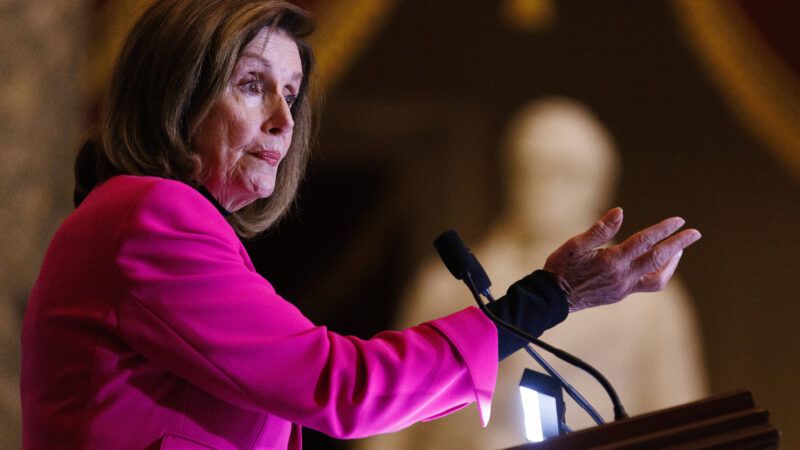Jen Psaki and Nancy Pelosi Push a Conspiracy Theory About Trump and Putin
Where are the fact-checkers and misinformation cops?

Earlier this week, former White House press secretary turned cable news host Jen Psaki interviewed Nancy Pelosi, the former speaker of the House, on her MSNBC show. Given the recent death of Russian dissident and opposition leader Alexei Navalny—likely on the orders of Russian President Vladimir Putin—the conversation quickly turned to foreign policy.
Psaki referenced Donald Trump's comments on the matter, noting that the former president had likened Navalny's political persecution and probable murder to his own treatment by Democratic prosecutors in his various trials; Trump also declined to specifically criticize or blame Putin for Navalny's death, instead releasing a bizarre statement about the "Open borders, Rigged elections, and grossly unfair courtroom decisions that are DESTROYING AMERICA." (Emphasis Trump's.)
When asked what she made of these comments, Pelosi openly speculated that Trump was not merely soft on Putin but compromised vis-à-vis some financial arrangement, blackmail or otherwise.
"You wonder what does Putin have on Donald Trump?" asked Pelosi.
A few minutes later, Pelosi again suggested that Putin had dirt on Trump, and this was the reason for Trump's relatively cordial relationship with the Russian dictator. Then she criticized Trump's views on NATO, referring to Trump as "what's his name" and then "nameless." (Psaki chimed in with "he who must not be named," so we're covering all the bases here.)
When Psaki asked Pelosi explicitly, "What do you think Putin has on him?" the former House speaker responded that she thought it was "probably financial."
Is it fair to criticize Trump for failing to forthrightly condemn the apparent assassination of Putin's chief rival? Of course. But it's easy to do so without falling prey to what is, at this point, a conspiracy theory. Over the course of the many years that journalists, political operatives, and special investigators doggedly pursued this matter, they turned up no evidence whatsoever that there are hidden motivations explaining Trump's seeming affection for Putin. Yet Democratic pundits and congressional leaders continue to portray a rhetorical and political disagreement—they are more anti-Russia, Trump is less anti-Russia—as evidence Trump is a Manchurian candidate.
These claims go all the way back to the 2016 election, in which Trump's surprise victory was attributed to Russian influence. Years later, the idea that Russia was the "decisive" factor per The New Yorker's Jane Mayer has been repeatedly debunked, but the notion that Trump's purported appeasement of Putin is a campaign kickback still has palpable sway over the Democratic Party and progressive media. As Reason's Jesse Walker put it: "While Trump can't get over 2020, the leading Democrats are stuck in an endless loop of 2016."
After Trump won the presidency in 2016, Russian attempts to promote him on social media took center stage as the de facto explanation for Hilary Clinton's loss. The mainstream media reported breathlessly on the Internet Research Agency (IRA), a Kremlin-backed troll farm that created fake accounts on Facebook, Instagram, Twitter, YouTube, and elsewhere.
It is absolutely true that Russia undertook this effort, which reached "millions of Americans," per The Washington Post. It is also true that the IRA purchased about $100,000 worth of political ads on Facebook.
What's not true is that this effort was either comprehensive, persuasive, or decisive. The content was seen by just a fraction of overall social media users—on Twitter, roughly 80 percent of misleading election-related content was glimpsed by just 0.1 percent of users—and wasn't specifically directed at swing voters in the states Clinton ended up losing.
Moreover, as I explained in my book, Tech Panic: Why We Shouldn't Fear Facebook and the Future, Russia's influence efforts were marginal compared to the efforts undertaken by the actual Trump and Clinton campaigns. The IRA spent $100,000 on ads; the campaigns spent $80 million. Each time a Facebook user stumbled across some content designed to persuade him to vote for Trump, it was overwhelmingly likely that the originator of said content was a real, sincere Trump fan rather than a Russian troll. In any case, the kinds of voters that swung the election to Trump—older, working-class white voters in Michigan and Pennsylvania—were not exactly the most online demographic. On the contrary, they disproportionately received their news from more traditional technologies, like talk radio and television.
Perhaps that's why so many in the mainstream media fell in love with the idea that Russian social media malfeasance was the real culprit behind Trump's win: It helped them to deflect from the fact that their own, obsessive coverage of his every word was worth $2 billion in free media for the Trump campaign.
So when Pelosi continues to say that Trump's behavior is best explained by some secret Russian connection, she is clinging to a theory that doesn't hold much water. It's always possible, of course, that subsequent reporting will reveal Putin is in fact either blackmailing Trump or paying him off. But for the time being, the sort of speculation both Pelosi and Psaki are engaging in is wildly speculative.
Note, however, that no mainstream fact-checking organization or misinformation watchdog group is springing into action to correct their claims. Liberal news outlets reported on the interview—The Huffington Post cheered Pelosi for putting Trump "on blast"—without calling it into question whatsoever. It's very telling what gets counted as misinformation and what doesn't. Pelosi was, until very recently, the third-most-powerful Democrat in Washington, D.C., yet her brand of conspiracy theorizing received little pushback. Psaki certainly didn't do her part.


Show Comments (220)